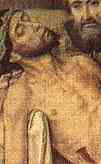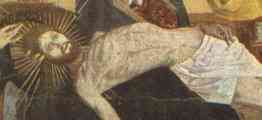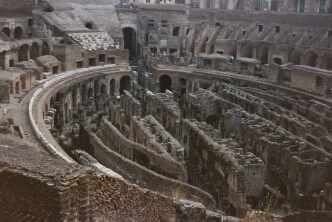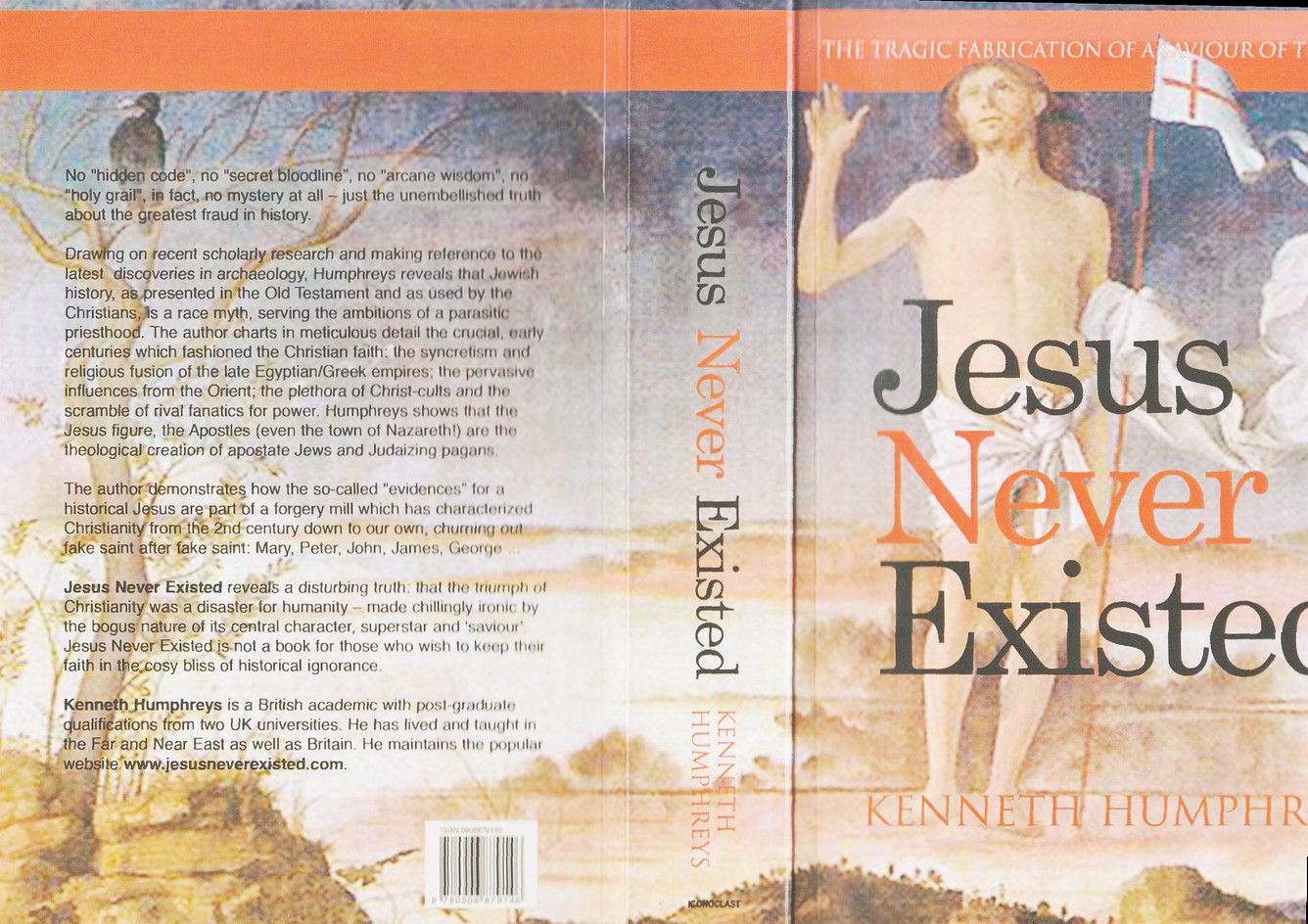Summary:
There's nothing new in the idea that 'Jesus' never existed; some Renaissance churchmen, Voltaire, Gibbon and many modern academics and writers have all suspected or believed this. However, it's censored out of the mass media, so most people are unaware of the possibility, which I briefly look at here. I hope to add more.—RW
[Fifteen years later, 2015:] I don't even know if there's a general topic of ancient revisionism, surveying what's been decoded of ancient writings, and, in this context ancient beliefs. Unfortunately the 20th-century with its disastrous incursions of 'Jewish' simple-minded parasitism has damaged, not just modern topics, but, very obviously, study of these ancient systems. Let's hope some progress begins to be made on all this, though of course it's impossible to be optimistic, or even melioristic. Vast numbers of 'scholars' have wasted time on a scale which I suppose might be regarded as amusing.
To Big-Lies Home Page
Phyllis Graham
's
The Jesus Hoax
(published by Leslie Frewin, London, apparently in 1974) seems unavailable anywhere on Internet. The author was a Carmelite nun, and there are long passages in a sort of intense neo-mystical but anthropological style, which is rather self-centred, and I imagine not to everyone's taste.
2022: Kenneth Humphreys first published Jesus Never Existed in 2005, buoyed up by Internet research. He has a website with the same name, jesusneverexisted.com of which the paperback cover is in the thumbnail picture to the right.
The website is detailed and has evidently grown, and is largely in question-detailed answer format. Humphreys has further taken advantage of Internet to have online-accessible interviews. I've written up a brief review of Jesus Never Existed.
The book is interesting, and packed with relevant information. I do have one problem with it, however. Some of the interviews and discussions (maybe all; I haven't checked) are between Humphreys and Jews. Kenneth Humphreys, like many others, puts his evidence for 'the triumph of Christianity was a disaster for humanity' well and convincingly. But Jewish financial manipulation has a high claim to have been more disastrous. He may himself be a Jew, or think he is.
Archibald Robertson
's 1946
Jesus: Myth or History
, which is quite good on documents (Thallus?, Pliny, Tacitus, Suetonius, Celsus, Josephus, Minucius Felix; but not e.g. Lucian, Corpus Inscriptionem Latinarum), is unavailable on Internet. Robertson was something of a fence-sitter and relies on the double meaning of 'myth' to avoid a definite conclusion.
Prof. G. A. Wells
is one of the most interesting writers on this topic; unfortunately I couldn't persuade him to talk to me with a view to being put up on Internet. He wrote [in 1982]: 'My fundamental theses remain the same [as in 1971]: namely, the earliest references to the historical Jesus are so vague that it is not necessary to hold that he ever existed; the rise of Christianity can, from the undoubtedly historical antecedents, be explained quite well without him; and reasons can be given to show why, from about AD 80 or 90, Christians began to suppose that he had lived in Palestine about fifty years earlier.' And (in 1996) 'Clergy who are not willing simply to reject or ignore scholarly criticism on the NT are faced with a serious problem. .. they can hardy tell their congregations that what has been proclaimed as Christian truth for nearly 2,000 years is little better than moonshine. ..' As this latter quotation suggests his methodology is mainly to examine the New Testament, though of course he considers other texts in detail too. (I don't know to what extent he examines 'Talmudic' material, or such issues as the 'synagogue of Satan' of Jews not accepting Jesus as a Messiah, or Jesus as a renegade type of Jew; as far as I could see he mostly used the Old Testament for background and the New Testament as a source for 'Jesus'). He is a Professor Emeritus in German, and quotes from many German scholars, suggesting that he turned to this line as a side-effect of his German studies (though for all I know he may have become interested in German as a result of a prior interest in Biblical exegesis). His books specifically on this subject are listed as:
The Jesus of the Early Christians (
1971),
The Historical Evidence for Jesus
(1982),
Who Was Jesus? A Critique of the New Testament Record
(1989),
The Jesus Legend
(1996). He has two titles on credulity, magic, and language (1991 and 1993). His two earliest books, on Herder & Grilparzer, were published in 1959 and 1969. And
Religious Postures: Essays on Modern Christian Apologists and Religious Problems
is dated 1988. As his date of birth is given as 1926, if we assume 62 as his retirement age, we have as his works more or less on this subject:- two titles when a Professor of German, and five afterwards. I don't know whether his views were frowned on by his department or led to friction; it's possible, as I infer from the fact that when I spoke to a successor at UCL, also called Wells (but no relation), this man was very keen to say he disagreed with G A Wells's views.
So far as I can see, he has become, particularly in his later books, interlocked with other disputants, so that much of his work consists in picking apart opponents' arguments. This methodology has the weakness that topics which are out of favour, or happen to be overlooked by both sides, naturally are under-represented. Thus he discusses the Turin Shroud, but not I think the more traditional relics. He discusses anti-Jewishness, but seems to have no idea of the possibilities of the Khazaria theory of Judaism. He seems not to look at rather absurd translations, like the mediaeval use of 'Lord', which is common at least to western Europe (the French New Testament for example has 'Seigneur': for a modern parallel, imagine 'the Boss God'!) He discusses the Dead Sea Scrolls in what is perhaps a conventionalised way, assuming the Qumran site certainly was a monastic one. Moreover one feels many of the opponents can't be very important; who now remembers the opponents of Galileo?
Professor Wells tells me (April 2000) that four items of his work have recently been made available on Internet Infidels; they are still here (2013). I quote the blurbs they give with links to them:—
 Earliest Christianity
(1999) [37K] Professor G.A. Wells continues the debate about the origins of Jesus and the development of Christianity. Drawing on the writings of recent theologians and historians and alluding to his latest book,
The Jesus Myth
, he throws light on the early history of Christianity.
Earliest Christianity
(1999) [37K] Professor G.A. Wells continues the debate about the origins of Jesus and the development of Christianity. Drawing on the writings of recent theologians and historians and alluding to his latest book,
The Jesus Myth
, he throws light on the early history of Christianity.
 G. A. Wells Replies to Criticisms of his Books on Jesus
(2000) [27K] Professor Wells replies to Rev. Neals' attacks on his position.
G. A. Wells Replies to Criticisms of his Books on Jesus
(2000) [27K] Professor Wells replies to Rev. Neals' attacks on his position.
 A Reply to J.P.Holding's 'Shattering' of My Views on Jesus and an Examination of the Early Pagan and Jewish References to Jesus
(2000) [55K] Wells replies to Holding's attacks, showing how Holding has misunderstood his position. Wells also defends his position on the early Pagan and Jewish references to Jesus.
A Reply to J.P.Holding's 'Shattering' of My Views on Jesus and an Examination of the Early Pagan and Jewish References to Jesus
(2000) [55K] Wells replies to Holding's attacks, showing how Holding has misunderstood his position. Wells also defends his position on the early Pagan and Jewish references to Jesus.
 A Resurrection Debate: The New Testament Evidence in Evangelical and in Critical Perspective
(2000) [108K] Professor Wells' commentary on the debate between Gary Habermas and Antony Flew on the resurrection of Jesus.
A Resurrection Debate: The New Testament Evidence in Evangelical and in Critical Perspective
(2000) [108K] Professor Wells' commentary on the debate between Gary Habermas and Antony Flew on the resurrection of Jesus.

|

|

|
Details from Western European altarpieces, and a painting, 1450 to 1550.
|

|
Exploiting peoples' limited sympathy with suffering:
faced with this sort of imagery, very few people, within the tradition or without, question the truth of the incidents shown. How
could
anyone be so
horrid?
And a useful technique to promote or defend wars, though modern manufactured stories tend to rely on much larger numbers of people.
I don't know whether anyone still believes the idea that Jesus' suffering was uniquely horrible. If you do, you might consider
that for example: German leaders after WW2 were tortured, their testicles being 'crushed beyond repair'; in Jewish GULags, countless Russians died of starvation and slave labour in arctic snow; that Vietnamese peasants were burnt to death with napalm, by Americans under instructions by Jews. Just a few examples. By comparison crucifixion was a slow, uneventful death.
|

|
'Colosseum' (Flavian Amphitheatre):
the picture shows its present ruined and excavated condition, and the passages, once covered by the floor, for animals and men.
So far as I know, the popular TV/ Hollywood/ preacher view, of Christians and lions, has no basis in fact, the opulent days of spectacle being long gone when Christianity became important. This seems to be widely known: for example, of CD references, Dorling Kindersley, Encarta 95, Funk & Wagnall, and Oxford Interactive, have no mention of Christians; Britannica lists early Christianity as a 'related topic' but has no explicit link.
Guidebooks are a bit evasive: a 'Blue Guide' says: 'According to tradition, the first of many martyrdoms in the Colosseum was that of St Ignatius of Antioch (c 110), although there is no historical basis for the tradition that Christians were martyred in the arena.'
The martyr legend seems to be post-Renaissance. I believe the arena has a newish 'commemorative' cross replacing an oldish one.
|
|
What does 'Christ' mean?
I expect most people think 'Christ' is a surname, like Jones, unaware that surnames are a relatively recent invention. It has to be grasped that the word is an adjective or title.
There are no OT references to 'Christ'. Standard dictionaries give the NT etymological meaning as 'anointed', i.e. ritually treated with 'oil'. This is stated to mean the same thing as 'messiah', always described as a Jewish word. From this viewpoint, 'Christ' is explained as acknowledgement of legitimate descent from 'David', without religious significance.
The word 'Christ' is said to come through High German; since however it's present in N. T. Greek (but in the Greek alphabet!), and in Latin (the Vulgate has inflected forms - christo, christi, christum and so on, including forms with anti- as the prefix) I suppose the simplified root form 'Christ' is believed to be Germanic. At the start of Peter's epistles (letters), there's a reference to the 'resurrection of Jesus Christ from the dead'. There are ambiguities in the translation, as with 'spirit' and 'breath', which help confuse the issue.
Moreover there are 'alternative' suggestions, for example that the word now written 'chrestus', with variations, meaning something like 'good people' or 'slaves', was the correct version of what's now 'Christ'.
Other suggestions: 'Christ' might have meant light, in the sense of 'light of the world'. Buddha as the 'Light of Asia' illustrates the principle. Mithra, Mazda, and the winged sun disk representation, all support this sense; the word 'chrysalis', meaning gilded, suggests something similar. There's an etymological tangle, too, of the similar words 'chrism' ('holy' oil) and perhaps charisma and eucharist.
The name is manufactured, like 'Will Shakespeare', 'Napoleon III', 'Stalin', and for that matter 'Cary Grant'.
Article by McCabe on 'Jesus' on this site
A few other issues
- 'Star of Bethlehem' and dating of A.D./B.C. Quite a few attempts have been made (projecting backwards, on the Halley's comet in 1066 principle) to correlate possible astronomical events with the 'star of Bethlehem'. One problem of course is that stars move in relation to the earth, so anyone following them will be in difficulties. The only exceptions I can think of are (1) a star at the north pole, (2) a star so low that it appears above the horizon in a fairly constant place.
But
no star will suspend itself over one place. And a low star would be difficult to follow, since it will invisible most of the time.
- There's an interesting tussle over whether there is a 'Judeo-Christian tradition'. The phrase must I think be 20th century; the earliest denial book known to me is Arthur A Cohen's 'The Myth of the Judeo-Christian Tradition' (1969, Harper and Row).
- It's of some interest to watch the complete censorship of doubts about the existence of Jesus in the media. Thus, over Christmas/New Year, 1998, I'm all but certain that no UK TV or radio programme addressed this issue. Even jokes are only permitted on stock subjects—overcrowded stables, pregnant virgins.
- It's amusing to see the same attitude in archaeology, which of course has a tradition of projecting errors back into the past. I quote from a review of
The Tomb of Christ
(1999 book by Martin Biddle) in the popularly-produced magazine
Current Archaeology
: '.. Christ was originally buried in a rock cut tomb just outside the city. Subsequently the city was extended and in 110 Hadrian levelled the whole area and built a temple above it. Once the Empire went Christian, Constantine began searching for the original tomb and in 325 a rock cut tomb was discovered and a magnificent church was built above it, the Church of the Holy Sepulchre. ..' (To be fair, Biddle's opinion of the authenticity of the structures is not mentioned in the review).
- Amusing side issues arise from the fact that anything unsupported by evidence has to be kept from common sense, and not be exposed to daylight. (The young H G Wells was carried out of a debating room when he referred to an 'itinerant preacher' to a group of fellow-students.) Here is a short compilation from the Bible. Was Jesus a good family man?
(The Old Testament is just as insulated from criticism as the New. Under a heading 'blasphemy row' I read (
Times
, Oct 21 1999) that Canongate publishing has published nine OT books with forewords saying e.g. that God was supposed to connive with Abraham to get richer by prostituting his wife.)
- A number of correspondents point out the well-known comparisons between religions, e.g. the virgin birth idea, death of gods, and so on, and the more detailed bits of copying in the many stories, but they don't seem to regard this as evidence against 'Jesus', which seems odd. On the subject of persistence of unexamined beliefs, see my short piece on the word
Was amen really Amun?
.
- Many rationalists don't realise that opposition to 'Jesus' is a traditional and well-entrenched part of Judaism—something many Jews are careful not to point out. Please be aware that opposition to the idea of 'Jesus' isn't necessarily a sign of critical thinking; it may be the opposite, and perhaps in practice more probably is, as it's part of the luggage of Judaism. For example, the American so-called 'skeptics' groups have never, as far as I know, published any work attacking the absurdities of Judaism. And this dichotomy has existed as much in Britain.
E-mail exchanges with this site
|
|
Links to other sites in 2000
(external links may not work 2013):-
Forgery in Christianity
by Joseph Wheless, which I've laid out with hyperlinks to make navigation a (comparative) pleasure. Much of this book deals with the Old Testament, and much with the start of the Middle Ages. Chapter III has some material on 'Jesus'.
Is It God's Word?
by Joseph Wheless. No, it isn't. This is an anti-Christian-fundamentalist work. Chapters XIII-XV are the ones dealing mainly with the life of Jesus.
 Radikalkritik
, site of Dr. theol. Herman Detering (of Berlin). Mostly in German, with some very long articles, and reproductions of books in pdf format. The links are mostly to websites in English, and include a Jewish, or 'Jewish', work (translated into English) satirising Jesus, or 'Jesus'.
Radikalkritik
, site of Dr. theol. Herman Detering (of Berlin). Mostly in German, with some very long articles, and reproductions of books in pdf format. The links are mostly to websites in English, and include a Jewish, or 'Jewish', work (translated into English) satirising Jesus, or 'Jesus'.
 Click here for another site,
Earl Doherty
's
The Jesus Puzzle.
Doherty's methodology is to try to examine all extant genuine documents from what we now call 0-200 AD with a view to deciding whether such a personage can be shown to exist from them. His site also includes
one easy-to-read article
from 1997, though it's presented in parts as '12 easy pieces'. (NB 'Earl' is his first name).
Click here for another site,
Earl Doherty
's
The Jesus Puzzle.
Doherty's methodology is to try to examine all extant genuine documents from what we now call 0-200 AD with a view to deciding whether such a personage can be shown to exist from them. His site also includes
one easy-to-read article
from 1997, though it's presented in parts as '12 easy pieces'. (NB 'Earl' is his first name).

 The Origins of Christianity and the Quest for the Historical Jesus Christ
, site by
'Acharya S'
(who is female—see picture. I'm tempted to say she can thumb my concordances any time, but that might be regarded as sexist. I've included
some e-mail exchanges
with her),
was
, I thought, a single long file, plus over 100 footnotes in several separate footnote files.
It refers to Wheless, Robertson, G A Wells and other well-known names in this field. This seems to have been replaced by a commercial book ad
on another Acharya S. site
; judging by the extracts it includes material of the sort in Doane's long-out-of-print book. General thesis is that Christianity was manufactured to try to keep the Roman Empire intact.
The Origins of Christianity and the Quest for the Historical Jesus Christ
, site by
'Acharya S'
(who is female—see picture. I'm tempted to say she can thumb my concordances any time, but that might be regarded as sexist. I've included
some e-mail exchanges
with her),
was
, I thought, a single long file, plus over 100 footnotes in several separate footnote files.
It refers to Wheless, Robertson, G A Wells and other well-known names in this field. This seems to have been replaced by a commercial book ad
on another Acharya S. site
; judging by the extracts it includes material of the sort in Doane's long-out-of-print book. General thesis is that Christianity was manufactured to try to keep the Roman Empire intact.
[Fifteen years later!:]
Acharya S. is now known as D M Murdock. She has now written on Moses as a manufactured myth. Her books are all pay-only which is understandable, but of course may delay her message getting out.
 Did Jesus Ever Live, or, Is Christianity Founded Upon A Myth?
by
Historicus
, a Freethinkers (and Infidels) site; printed 1972, anonymously (at least, it's anonymous here). Mentions Joseph McCabe, Prof G.A. Wells, and others; also Dead Sea Scrolls.
Did Jesus Ever Live, or, Is Christianity Founded Upon A Myth?
by
Historicus
, a Freethinkers (and Infidels) site; printed 1972, anonymously (at least, it's anonymous here). Mentions Joseph McCabe, Prof G.A. Wells, and others; also Dead Sea Scrolls.
 Christ a Myth
by Gary Courtney. Galatians/ an explanation of the invention of Jesus from the stage/ Caesar's life: parallels?/ Attis and Cybele. This is a new site to me; thanks to RS for e-mailing.
Christ a Myth
by Gary Courtney. Galatians/ an explanation of the invention of Jesus from the stage/ Caesar's life: parallels?/ Attis and Cybele. This is a new site to me; thanks to RS for e-mailing.
 Christ a Fiction
by
Robert M. Price
(1997), an ex-apologist. Arguments from common-sense, history, anthropology, general evidence. From 'Internet Infidels' library.
Christ a Fiction
by
Robert M. Price
(1997), an ex-apologist. Arguments from common-sense, history, anthropology, general evidence. From 'Internet Infidels' library.
 [
What seems to be an eccentric (and badly laid-out) site
devoted to the assertion that one Lucius Calpurnius Piso invented much of Christianity as a controlling device by the Romans. (This man appears e.g. in Plutarch and Tacitus, and was at any rate well-positioned for such a thing; so I've included the site here). Much on numerology and hidden codes, and quite a bit of spurious etymology, e.g. equating Babylon with Las Vegas, and 'foreskin' with earliest flesh. Anonymous, or pseudonymous, if you count 'James First Apostle to the Antichrist' as a pseudonym.] [
What seems to be an eccentric (and badly laid-out) site
devoted to the assertion that one Lucius Calpurnius Piso invented much of Christianity as a controlling device by the Romans. (This man appears e.g. in Plutarch and Tacitus, and was at any rate well-positioned for such a thing; so I've included the site here). Much on numerology and hidden codes, and quite a bit of spurious etymology, e.g. equating Babylon with Las Vegas, and 'foreskin' with earliest flesh. Anonymous, or pseudonymous, if you count 'James First Apostle to the Antichrist' as a pseudonym.]
Big-Lies Home Page
Any interesting info? Email me
|



 Radikalkritik
, site of Dr. theol. Herman Detering (of Berlin). Mostly in German, with some very long articles, and reproductions of books in pdf format. The links are mostly to websites in English, and include a Jewish, or 'Jewish', work (translated into English) satirising Jesus, or 'Jesus'.
Radikalkritik
, site of Dr. theol. Herman Detering (of Berlin). Mostly in German, with some very long articles, and reproductions of books in pdf format. The links are mostly to websites in English, and include a Jewish, or 'Jewish', work (translated into English) satirising Jesus, or 'Jesus'.
